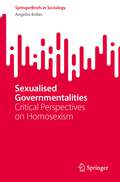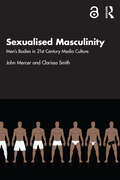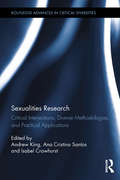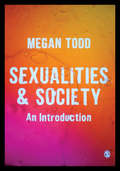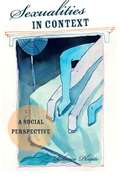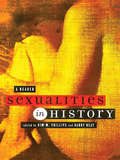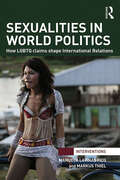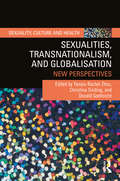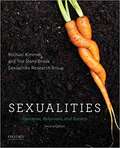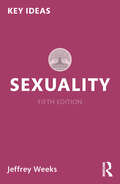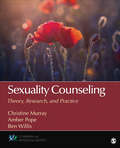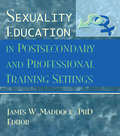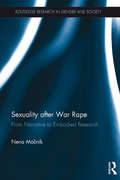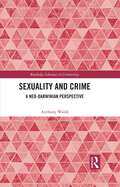- Table View
- List View
Sexualised Governmentalities: Critical Perspectives on Homosexism (SpringerBriefs in Sociology)
by Angelos BollasThis book critically examines the concept of sexualised governmentalities, a framework for understanding the evolving discourse and power dynamics surrounding discrimination on the basis of sexual practices. Central to this exploration is the shift from traditional heteronormative perspectives to a more complex hetero/homonormative context, where the structure and organisation of sexual relationships gain prominence over the gender or sexual orientation of the participants. A key focus of the book is the concept of homosexism within the realm of gay masculinity studies. The author discusses homosexism as a form of discrimination experienced by gay men from other gay men, highlighting the influence of heteronormative patriarchal society on these interactions. It calls for a broader recognition and acceptance of diverse sexual expressions and challenges the reader to re-evaluate the societal norms around masculinity and sexual behaviour. Sexualised Governmentalities is an important contribution to the discourse on sexual identity and practice, offering insights for a more inclusive and empathetic understanding of sexual diversity.
Sexualised Masculinity: Men’s Bodies in 21st Century Media Culture
by John Mercer Clarissa SmithSexualised Masculinity: Men’s Bodies in 21st Century Media Culture explores evolving portrayals of masculinity in contemporary media, focusing on the increasing eroticisation of the male body.This book examines how traditional and digital media – from films and television to social media platforms and fashion – have transformed the ways masculinity is represented and perceived. Through a wide array of case studies, it highlights how male bodies are now sites of erotic value, challenging long-standing norms and expectations. By exploring both global and local media, John Mercer and Clarissa Smith provide insights into the shifting landscape of gender and sexuality, offering a critical perspective on how masculinity is consumed, performed, and commodified in today’s world.This book is essential for students and scholars in fields such as gender studies, media studies, cultural studies and social history, and is particularly relevant for those interested in understanding the intersections of masculinity, media and sexuality in the 21st century.
Sexualisierte Gewalt an allgemeinbildenden Schulen: Eine struktur- und machttheoretische Analyse (BestMasters)
by Anna von KeudellIn diesem Buch werden allgemeinbildende Schulen struktur- und machttheoretisch untersucht, um Gelegenheitsstrukturen in der Schüler*innen-Lehrer*innen-Beziehung für die Verübung sexualisierter Gewalt zu erkennen. Mit Hilfe einer Zusammenführung von Forschungsergebnissen zu sexualisierter Gewalt, dem Vier-Faktoren-Modell von David Finkelhor, mit dem Machtverständnis von Michel Foucault beleuchtete Schulstrukturen sowie einer Auswahl an Antinomien pädagogischen Handelns nach Werner Helsper wird eine Perspektive eingenommen, die den ,ganz normalen Alltag‘ in Schulen untersucht. Es wird herausgearbeitet, inwiefern und wodurch in diesem Alltag aus Routinen und Regeln Gelegenheitsstrukturen zur Verübung sexualisierter Gewalt entstehen, was diese begünstigt und wann und wie diese (aus-)genutzt werden können. In der Ergebnissicherung der Analyse werden die erkannten Gelegenheitsstrukturen aufgeführt und, auf deren Grundlage, im Ausblick Empfehlungen für die Entwicklung von Schutzkonzepten an Schulen erarbeitet.
Sexualisierte Gewalt und digitale Medien: Reflexive Handlungsempfehlungen für die Fachpraxis
by Frederic Vobbe Katharina KärgelIn dieser Open-Access-Publikation stellen Katharina Kärgel und Frederic Vobbe anhand sieben typischer Fallbeispiele Handlungsempfehlungen für einen adäquaten Umgang mit mediatisierter sexualisierter Gewalt dar. Die Empfehlungen sind das Ergebnis des vom Bundesministerium für Bildung und Forschung geförderten Projekts „HUMAN“. Sie wurden empirisch unter Beteiligung von Betroffenen sowie Expert*innen der Bereiche Recht, Psychologie, Pädagogik und Soziale Arbeit entwickelt. Sie umfassen jeweils Fallreflexionen sowie konkrete Handlungsansätze.Digitale Medien sind Instrument und Kontext sexualisierter Gewalt gegen Kinder und Jugendliche. Sie müssen bei Übergriffen durch zuvor fremde wie nahestehende Personen stets mitbedacht werden. Ihr Einsatz verstetigt die Belastungen Betroffener und führt zu einer hohen Komplexität von Interventionen.
Sexualities Research: Critical Interjections, Diverse Methodologies, and Practical Applications (Routledge Advances in Critical Diversities)
by Andrew King, Ana Cristina Santos and Isabel CrowhurstHow is sexuality studied methodologically? How are we innovating, methodologically, in the study of sexuality? What impact, if any, has the increase in mixed methodologies had on the study of sexuality? Sexualities Research brings together original contributions by emerging and world-leading scholars of sexuality. Through this volume the authors seek to address how theoretical and methodological choices enable wider dissemination and social impact of sexualities research. Indeed, covering a diverse range of theoretical perspectives and methodologies to provide important new insights into human sexuality, the chapters cover an array of topics from the experience of researching sexuality, to using theories in new and innovative ways. With an international scope, Sexualities Research also builds on the re-emergence of the European Sociological Association Sexuality Research Network and asks important questions about the study of sexuality in contemporary societies against the background of political upheaval and economic troubles. Certainly, this collection shows the importance and vitality of sociological understandings of human sexuality in the twenty-first century. An enlightening volume consisting of a variety of case studies and theoretical research, Sexualities Research will appeal to undergraduate and postgraduate students, as well as postdoctoral researchers who are interested in fields such as Sociology, LGBT/Queer Studies and Gender Studies.
Sexualities and Society: An Introduction
by Megan ToddSexualities and Society adopts a fresh, sociological perspective to explore the development of sexualities across both public and private spheres, giving thoughtful consideration to heterosexualities, cis, bi and trans identities. Divided into three parts, the book starts with an exploration into the history of sexuality, before covering the key theories, and how research into sexualities has been, and could be, conducted. Parts two and three examine how sexualities are framed by cultural factors and social institutions – including the media, religion, and politics – and considers the impact of how significant issues such as identity, age, health and violence relate to sexuality. Employing a range of international case studies, up to date policy developments, and engaging learning features such as ‘discussion points’ and ′fact file′ sections, this book is essential reading for students studying sexuality across sociology, social policy, social care, media, and politics.
Sexualities and Society: An Introduction
by Megan ToddSexualities and Society adopts a fresh, sociological perspective to explore the development of sexualities across both public and private spheres, giving thoughtful consideration to heterosexualities, cis, bi and trans identities. Divided into three parts, the book starts with an exploration into the history of sexuality, before covering the key theories, and how research into sexualities has been, and could be, conducted. Parts two and three examine how sexualities are framed by cultural factors and social institutions – including the media, religion, and politics – and considers the impact of how significant issues such as identity, age, health and violence relate to sexuality. Employing a range of international case studies, up to date policy developments, and engaging learning features such as ‘discussion points’ and ′fact file′ sections, this book is essential reading for students studying sexuality across sociology, social policy, social care, media, and politics.
Sexualities in Context
by Rebecca F. PlanteWritten in an accessible and clear manner, Sexualities in Context presents focused overviews and explorations of some of the most timely issues in the social construction of sex. This brief text is suitable for courses with coverage of gender and sexuality in sociology, psychology, women's and gender studies, and human development. The only book of its kind to address sexualities from a social perspective, Plante's analysis of the context of sexuality, sexual behaviors, and identities is both intelligent and readable. With contemporary topics, such as 'hooking up,' sexual fantasies, and bisexualities, along with examples of how to apply critical thinking, students are empowered to think outside their comfort zones and encouraged to explore the topic of sex in a new context. Employing useful pedagogical features like end-of-chapter questions and suggested projects, this is the ideal text to help students see that sex is not only personal but social and political as well.
Sexualities in History: A Reader (Themes In History Ser. #6)
by Kim M. Phillips Barry ReayOver the past twenty years, historians have overturned nearly everything we once took for granted about human sexuality. Gender, sexual orientation, "deviance," and even the biology of sex have been unmasked for what they are-historically specific, culturally contested, and above all, unstable constructions.
Sexualities in World Politics: How LGBTQ claims shape International Relations (Interventions)
by Markus Thiel Manuela Lavinas PicqAs LGBTQ claims acquire global relevance, how do sexual politics impact the study of International Relations? This book argues that LGBTQ perspectives are not only an inherent part of world politics but can also influence IR theory-making. LGBTQ politics have simultaneously gained international prominence in the past decade, achieving significant policy change, and provoked cultural resistance and policy pushbacks. Sexuality politics, more so than gender-based theories, arrived late on the theoretical scene in part because sexuality and gender studies initially highlighted post-structuralist thinking, which was hardly accepted in mainstream political science. This book responds to a call for a more empirically motivated but also critical scholarship on this subject. It offers comparative case-studies from regional, cultural and theoretical peripheries to identify ways of rethinking IR. Further, it aims to add to critical theory, broadening the knowledge about previously unrecognized perspectives in an accessible manner. Being aware of preoccupations with the de-queering, disciplining nature of theory establishment in the social sciences, we critically reconsider IR concepts from a particular LGBTQ vantage point and infuse them with queer thinking. Considering the relative dearth of contemporary mainstream IR-theorizing, authors ask what contribution LGBTQ politics can provide for conceiving the political subject, as well as the international structure in which activism is embedded. This book will be of interest to students and scholars of gender politics, cultural studies and international relations theory.
Sexualities, Transnationalism, and Globalisation: New Perspectives (Sexuality, Culture and Health)
by Yanqiu Rachel Zhou, Christina Sinding and Donald GoellnichtThis innovative book explores the dynamic and contested interactions – including the mutually constitutive relationships – among sexualities, transnationalism, and globalisation. Bringing together contributors with a variety of disciplinary, geographic, and theoretical perspectives, this text explores new theories and trends in sexuality research, including lived experiences of sexuality in this rapidly globalising world; changing relationships between sexualities, transnationalism, and globalisation; interventions, activism, and policy responses to the global challenges of sexual health; and relevant reflections on and implications for equity and social justice in the ongoing processes of contemporary globalisation. It is comprised of three sections, focusing on: transnational sexualities; transnational sexual politics; and transnational sexual activism. Sexualities, Transnationalism, and Globalisation will be of interest to students and scholars from a range of disciplines and fields, including sociology, sexuality studies, anthropology, geography, international relations, politics, and public health.
Sexualities: Identities, Behaviors, And Society
by Michael Kimmel The Stony The Stony Brook Sexualities Research GroupThis anthology on sexuality addresses such key questions as: How are sexualities socially constructed? Why are sexualities more than just natural "urges"? and How are sexualities personal, social, and political? Using multiple disciplines, international populations, and theories to explore sexualities, it opens with classical and contemporary theories, and then explores the ways in which we learn about sexual activities and develop sexual identities. Sexualities: Identities, Behaviors, and Society has a strong sociological approach, but also considers other important perspectives (psychology, biology, history). It is rigorous, yet accessible and engaging, covering classical and contemporary arguments and perspectives.
Sexualities: Past Reflections, Future Directions
by Yvette Taylor Sally HinesThis collection examines recent theoretical and methodological debates, shifts in law and policy, and social and cultural changes around sexuality. It sets out new ways of conceptualizing and researching sexuality and explores persistently marginalised and re-traditionalised sexual practices, subjectivities and identities.
Sexuality
by Jeffrey WeeksFor over twenty years, Sexuality has provided a cutting edge introduction to debates about sexualities, gender, and intimate life. Previous editions included pioneering discussions of the historical shaping of sexuality, identity politics, the rise of fundamentalism, the social impact of AIDS, the influence of the new genetics, ‘global sex’, queer theory, ‘sex wars’, the debates about values, new patterns of intimacy, and much more. In this new edition, Jeffrey Weeks offers a thorough update of these debates, and introduces new concepts and issues. Globalization is now a key way of understanding the reshaping of sexual life, and is discussed in relation to global flows, neo-liberalism, new forms of opposition, cosmopolitanism and the heated debates around sex trafficking and sex tourism. Arguments about the regulation and control of sexuality, and the intersection of various dimensions of power and domination are contextualised by a sustained argument about the importance of agency in remaking sexual and intimate life. In particular, new forms of Lesbian, Gay, Bisexual, Transgender and Queer politics, and the high impact of the debates about same-sex marriage are explored. These controversies, in turn, feed into debates about what is ‘transgressive’, ‘normal’, ‘ordinary’; into the nature of heter-normativity; and into the meanings of diversity and choice. To conclude, the book turns to questions of values and ethics, recognition, sexual citizenship and human sexual rights. This book displays the succinctness, clarity and comprehensiveness for which Jeffrey Weeks has become well known. It will appeal to a wide range of readers internationally.
Sexuality
by Jeffrey WeeksWe are almost programmed into thinking of our sexuality as a wholly natural feature of life. But sexual relations are but one form of social relations, as Jeffrey Weeks makes clear in his book. Drawing on the analyses of Michel Foucault, amongst others, the book examines the social, moral and political issues raised by contemporary forms of sexuality. Weeks provides an authoritative introduction to the sociology of sexuality, discussing its cultural and socio-historical construction, it's relationship with power and the State's involvement in its rationalisation and regulation. This second edition is also updates to include global and postcolonial perspectives on sexuality, queer theory, the internet and cybersex, AIDS as a global phenomenon and international debates on the politics of sexuality. This book is an indispensable introduction to this complex and expanding field.
Sexuality
by Jeffrey WeeksThe new edition of Sexuality displays the qualities which have made this book a key text for understanding human sexuality. Jeffrey Weeks blends deep empirical knowledge with theoretical sophistication and a sensitivity to the politics of sexuality. Framing and shaping the analysis is an acute understanding of the world-wide changes that are remaking sexuality and gender, dramatized by the globalization of sex and the rise and rise of cybersex. These changes have opened unprecedented opportunities for sexual interaction and sexual choice, but also posed new sexual dangers and anxiety. Debates about the regulation and control of sexuality, and the intersection of various dimensions of power and domination are contextualised by a sustained argument about the importance of agency in remaking sexual and intimate life, above all for women and for LGBTQ people. Particular attention is given to the debates about same-sex marriage which symbolize the transformations that have taken place. These controversies in turn feed into debates about intimate citizenship and human sexual rights in a rapidly changing world.
Sexuality (Key Ideas)
by Jeffrey WeeksSexuality is the fifth revised and updated edition of the classic text for understanding human sexuality. This new edition brings the arguments and evidence fully up to date and explores their implication for many topical controversies, around LGBTQ+ rights, the trans experience and gender fluidity, same-sex marriage, sexual autonomy and consent, and the meanings of sexual choice. Since it was first published in the 1980s, Sexuality has been at the cutting edge of the study of the social and historical meanings of sexuality. Blending deep empirical knowledge with theoretical sophistication and an acute sensitivity to the politics of sexuality, the book offers an informed framework for understanding the complexities of sexual life. A key insight of the book is that the ways we think and speak about sexuality make a major contribution to the ways we live it. Sexuality may be rooted in biological possibilities, but it is shaped and experienced through languages and meanings which are inevitably historical and social in nature. The book explores with clarity and precision the invention and re-invention of sexual meanings, the question of what constitutes a true sex and the biological and social roots of sexual difference, the challenges of diversity, the re-making of sexuality as a highly divisive political subject and the implications of the transformation of intimate life in the past few generations. These are seen in the context of profound changes that are re-fashioning the world, especially globalisation, cyber-sex, and the rise of new forms of agency, including among women and LGBTQ+ people, which have fed into new claims for sexual human rights. This new edition of Sexuality will be an indispensable guide for students in the social sciences with an interest in the ever-changing worlds of sexuality.
Sexuality And Gender In The Classical World: Readings And Sources (Interpreting Ancient History)
by Laura McClureThis volume provides essays that represent a range of perspectives on women, gender and sexuality in the ancient world, tracing the debates from the late 1960s to the late 1990s.
Sexuality Beyond Consent: Risk, Race, Traumatophilia (Sexual Cultures)
by Avgi SaketopoulouRadical alternatives to consent and traumaArguing that we have become culturally obsessed with healing trauma, Sexuality Beyond Consent calls attention to what traumatized subjects do with their pain. The erotics of racism offers a paradigmatic example of how what is proximal to violation may become an unexpected site of flourishing. Central to the transformational possibilities of trauma is a queer form of consent, limit consent, that is not about guarding the self but about risking experience. Saketopoulou thereby shows why sexualities beyond consent may be worth risking-and how risk can solicit the future.Moving between clinical and cultural case studies, Saketopoulou takes up theatrical and cinematic works such as Slave Play and The Night Porter, to chart how trauma and sexuality join forces to surge through the aesthetic domain. Putting the psychoanalytic theory of Jean Laplanche in conversation with queer of color critique, performance studies, and philosophy, Sexuality Beyond Consent proposes that enduring the strange in ourselves, not to master trauma but to rub up against it, can open us up to encounters with opacity. The book concludes by theorizing currents of sadism that, when pursued ethically, can animate unique forms of interpersonal and social care.
Sexuality Counseling: Theory, Research, and Practice (Counseling and Professional Identity)
by Christine E. Murray Benjamin T. Willis Amber L. Pope"Sexuality Counseling: Theory, Research, and Practice is an important resource for mental health practitioners. Sexuality is complex and rather than attempting to simplify, this book works within that complexity in a well-organized and comprehensive way." - Alexandra H. Solomon, Northwestern University Providing a comprehensive, research- and theory-based approach to sexuality counseling, this accessible and engaging book is grounded in an integrative, multi-level conceptual framework that addresses the various levels at which individuals experience sexuality. At each level (physiological, developmental, psychological, gender identity and sexual orientation, relational, cultural/contextual, and positive sexuality), the authors emphasize practical strategies for assessment and intervention. Interactive features, including case studies, application exercises, ethics discussions, and guided reflection questions, help readers apply and integrate the information as they develop the professional competency needed for effective practice.
Sexuality Counseling: Theory, Research, and Practice (Counseling and Professional Identity)
by Christine E. Murray Benjamin T. Willis Amber L. Pope"Sexuality Counseling: Theory, Research, and Practice is an important resource for mental health practitioners. Sexuality is complex and rather than attempting to simplify, this book works within that complexity in a well-organized and comprehensive way." - Alexandra H. Solomon, Northwestern University Providing a comprehensive, research- and theory-based approach to sexuality counseling, this accessible and engaging book is grounded in an integrative, multi-level conceptual framework that addresses the various levels at which individuals experience sexuality. At each level (physiological, developmental, psychological, gender identity and sexual orientation, relational, cultural/contextual, and positive sexuality), the authors emphasize practical strategies for assessment and intervention. Interactive features, including case studies, application exercises, ethics discussions, and guided reflection questions, help readers apply and integrate the information as they develop the professional competency needed for effective practice.
Sexuality Education in Postsecondary and Professional Training Settings
by James Wm MaddockSexuality Education in Postsecondary and Professional Training Settings keeps you up-to-date on the trends and issues in sexuality education in colleges, universities, and professional training institutions. A diverse group of authors, all experienced sexuality educators, offers summary information, critical commentary, thoughtful analysis, and projections of future trends in sexuality education in postsecondary settings. This keeps you current on the status of sexuality education and will move you to consider a variety of concerns and challenges in designing and implementing sexuality education courses and programs. Finally, the chapters present you with valuable resources, ranging from historical references to contemporary website information.Beginning with an historical perspective on twentieth-century sexuality education, Sexuality Education in Postsecondary and Professional Training Settings includes information on the nature and extent of sexuality education in contemporary colleges and universities, as well as in institutions training teachers, clergy, and physicians. The book's expert authors analyze undergraduate curricular and pedagogical issues, as well as problems in classroom climate and the challenges of meeting objectives for behavioral change. Specific topics you learn about include:guidelines for teaching undergraduate sexuality courses--with a focus on philosophical issues; how to develop objectives and implement teaching strategies; print, media, and Internet resources for teaching; and commentary on controversial issues effects of various workshops on the contraceptive-related attitudes and behaviors of college studentssexuality education and HIV/AIDS prevention education in teacher preparation institutionsperceptions of faculty regarding curriculum and approaches to sexuality education in clergy training institutionssexuality education in medical school curricula in the U.S. and Canada Sexuality Education in Postsecondary and Professional Training Settings is a valuable guide for sexuality educators in postsecondary settings and educators in corollary areas such as health education, educational psychology, family education, or curriculum development. Also an informative and useful text for scholars, researchers, professionals, and students in the fields of sexuality education, behavioral sciences, applied social sciences, and social policy, this book presents a variety of philosophical and methodological approaches to vital issues, ranging from qualitative phenomenological and interpretive methods to quantitative analyses to critical essays.
Sexuality Reimagined: MSM in Modern India
by Shailja TandonThe book examines how medical knowledge is produced around bodies that do not fit in the heteronormative framework of the state’s rationale and processes. The marginal bodies studied in this research are termed MSM, men who have sex with men, categorized as a high-risk group in the backdrop of HIV/AIDS. These Queer bodies entered the registers of epidemiology and governmentality. This classification is the point of departure for the book. The book interrogates and asks how does a sexual subject become a political question? To answer this political trajectory, the book analyses the category of risk in biomedicine. It investigates how the category of risk becomes critical to the Indian state’s rationale and policies wherein, through the ambit of health and population, sexuality is managed. Unearthing the sexual politics in South Asia, the book, based on rich empirical evidence derived from the lived experiences of MSM, narrates the construction of sexual subjectivity and masculinity. The process of construction occurs in negotiation with the Indian state, bringing forth the dimension of the Indian state as a medico-legal governmentality regime and how MSM takes on the identity of a medicalized subject.
Sexuality after War Rape: From Narrative to Embodied Research (Routledge Research in Gender and Society)
by Nena MočnikThis book examines the potential impact of rape survivors’ traumatic experiences in post-conflict zones. With specific attention given to the experiences of women who were sexually abused during the breakup of the former Yugoslavia, it addresses the sexuality of survivors, which has so far been inadequately researched, and challenges the stereotypical and victimized images and narrations that have so far prevailed in academic and public discourse about women survivors while exploring the effects of those narratives on the political, social and economic status of the survivors themselves. Methodologically innovative, the book questions the processes of re-victimization that can follow fieldwork with survivors and introduces the theoretical and practical foundations of applied drama and community theater as a research approach in this field, revealing its potential as a means of expressing a range of ethnographic, anthropological and case-study research findings. Based on the narratives of advocates, scholars and different social stakeholders, together with new drama-based methodologies employed directly with survivors, Sexuality after War Rape: From Narrative to Embodied Research offers a sensitive and ethically-responsible research approach to contesting assumptions about the sexualities of survivors of sexual violence and revealing the emancipatory potential of testifying. This book will appeal to scholars of sociology and gender studies, victimology and sexuality.
Sexuality and Crime: A Neo-Darwinian Perspective (Routledge Advances in Criminology)
by Anthony WalshWritten by one of the leading figures in biosocial criminology and evolutionary psychology, this work explores the tight relationship between criminality and indiscriminate sexuality within the framework of life history theory. The underlying thesis is that traits associated with a strong libido, indiscriminately expressed, are intertwined with traits associated with criminal behavior; that is, excessive interest in sexual adventures pursued in an irresponsible way is undergirded by the same individual short- run hedonistic traits that define criminality. While traditional criminology tends to view sexual and criminal behavior as separate domains, many biosocial criminologists, evolutionary psychologists, neuroscientists, and behavioral and molecular geneticists are not at all surprised that a link exists between criminality and sexuality. Research shows that the statistical relationship between indiscriminate sexuality and criminal behavior is stronger than for most other variables associated with crime, although most studies dealing with this relationship are from outside the dominant environmentalist paradigm of criminology. Using life history theory as the theoretical umbrella for exploring the relationship between indiscriminate sexuality and criminal behavior, the book explores how and why criminal behavior is related to hypersexuality. Life history theory, which has a long and fruitful history of use among evolutionary biologists who use it to investigate the relationship between mating strategies and the environment among various species of animals (including humans) is particularly suited to understanding how an exclusive focus on mating effort is related to criminal behavior. This book will be of interest to scholars and students in criminology, psychology, and sociology, and anyone interested in examining the interconnection between biological, psychological, and socio- environmental factors in relation to criminal behavior.
